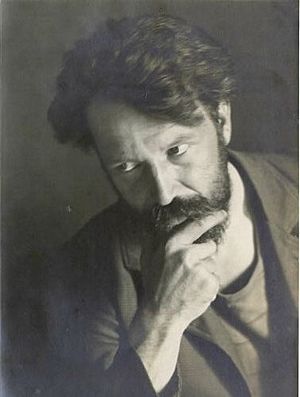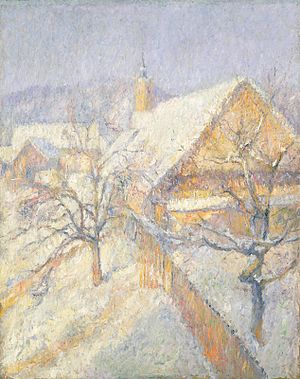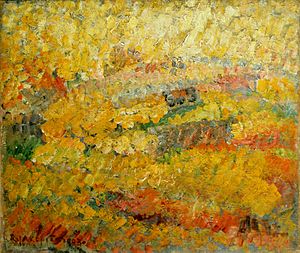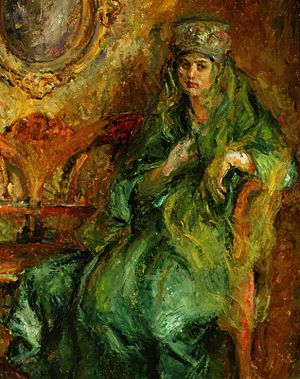Rihard Jakopič facts for kids
Rihard Jakopič (born April 12, 1869 – died April 21, 1943) was a famous Slovene painter. He was a leading artist in the Impressionist style in Slovenia. He also helped support other artists and shared his ideas about art.
Jakopič is seen as one of the first Slovene Impressionist painters. He worked alongside other important artists like Matej Sternen, Matija Jama, and Ivan Grohar.
Life of Rihard Jakopič
Rihard Jakopič was born in 1869 in Krakovo, a part of Ljubljana. At that time, Ljubljana was the capital of Carniola, which was part of Austria-Hungary. He was the youngest of eight children.
From 1879 to 1887, Jakopič went to an intermediate secondary school. After passing an exam, he began studying at the Academy of Fine Arts in Vienna. He had to return home for a short time because he was sick. He then continued his studies in 1888.
In 1889, he went to the Academy of Fine Arts in Munich. In 1890, he studied at the Ažbe Art School, also in Munich. Later, he lived in Ljubljana and helped create the Slovene Art Society. After 1902, he lived in Škofja Loka.
In 1903, Jakopič continued his art studies at the Academy of Fine Arts in Prague. He moved back to Ljubljana in 1906. He was also one of the first members of the Slovenian Academy of Sciences and Arts, which started in 1938.
Rihard Jakopič passed away at his home in Ljubljana on April 21, 1943. He was buried at Holy Cross Cemetery (now Žale Cemetery) a few days later.
Jakopič's Legacy in Art
Rihard Jakopič created many artworks during his life. More than 1200 of his paintings and 650 drawings are still preserved today.
In Ljubljana, Jakopič started the Slovene School of Impressionist Drawing and Painting. This school was a very important step towards creating the Academy of Fine Arts at the University of Ljubljana. He also helped to establish the National Gallery of Slovenia.
In 1908, he built a special art building called a pavilion in Tivoli Park. This building was designed by the architect Max Fabiani. The Jakopič Pavilion became the main place for art exhibitions in the Slovene Lands at that time. Sadly, the pavilion was taken down in 1962 because a railway line needed to be moved.
How Jakopič is Remembered
Many things in Slovenia are named after Rihard Jakopič to honor his contributions to art.
In 1965, a primary school in Šiška was named after him. Since 1969, the Jakopič Award has been given out every year. This is the highest award in fine arts in Slovenia.
Between 1970 and 1972, a statue of Jakopič was put up where his pavilion used to stand. This statue was made by Bojan Kunaver. In 1979, a new art space called the Jakopič Gallery opened in Ljubljana.
After Slovenia became an independent country, Jakopič's picture was placed on the 100 Slovenian tolar banknote. This banknote was used from 1991 until Slovenia started using the euro in 2007.
Selected Artworks
- Sončni breg (Sunny Hillside) (1903), National Gallery, Ljubljana
- Breze v jeseni (Birches in Autumn) (1903), National Gallery, Ljubljana
- Kamnitnik v snegu (Kamnitnik in the Snow) (1903), National Gallery, Ljubljana
- Zima (Winter) (1904), National Gallery, Ljubljana
- Pri svetilki (By the lamp) (1904), National Gallery, Ljubljana
- Študija sonca (A Study of the Sun) (1905), National Gallery, Ljubljana
- Križanke (1909), National Gallery, Ljubljana
- Spomini (Memories) (1912), National Gallery, Ljubljana
- Zeleni pajčolan (The Green Veil) (1915), National Gallery, Ljubljana
- Večer na Savi (Evening on the Sava River) (1926), National Gallery, Ljubljana
- Slepec (Blind man) (1926), National Gallery, Ljubljana
 | Laphonza Butler |
 | Daisy Bates |
 | Elizabeth Piper Ensley |





